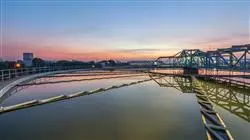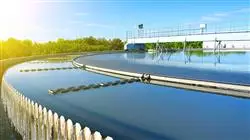University certificate
Accreditation/Membership

The world's largest faculty of engineering”
Introduction to the Program
Water is a natural resource which is essential to the survival of our planet. Learn how to manage its distribution in urban areas and develop new proposals to introduce in the sector”

Everyone agrees that water is an essential resource and for this reason, since long ago, efforts have been made to guarantee a safe, relaible and, above all, high-quality supply is available. Economic investment in this sector has increased in recent years, a factor which has led to the need for support from trained professionals who know and understand how this vital liquid is processed, distributed and reused.
This Advanced master’s degree is a unique opportunity to give students the chance to deepen their understanding of water management and urban waste services. A review will be carried out of everything related to the water cycle in urban areas and the measures which have been adopted by the sector to ensure responsible consumption. All of this is marked by the 2030 Agenda, a proposal which was signed by the member states of the United Nations that aims to move the world towards a sustainable and environmentally friendly society.
This is essential nowadays, due to the increasing scarcity and the decrease in the quality of the water available to us. As a result, urban areas are constantly in need of a better water supply and, in order to achieve this, the engineers in charge must be trained and specialized with a clear understanding of the new hydraulic pump proposals, which must be built appropriately monitored in unique stations.
This program will also be of great interest due to its extensive coverage of urban waste management, a necessity brought about as a result of the waste which is produced in cities, such as debris, plastics, organic matter etc. Students will learn all about how the classification system works according to the regulations, its effects on public health, the importance of reducing how much waste is produced and the innovative digitization of refuse by organizations (based on Deep Learning).
Students who enrol on this Advanced master’s degree in Water and Urban Waste Services Engineering will acquire the necessary skills to improve their professional profile, becoming engineers who are fully capable of working anywhere in the world. This qualification will allow them to professionaly promote technological, social or cultural progress within a knowledge-based society, following sustainable precepts.
The 2030 Agenda has been adhered to in recent years in order to ensure the responsible use of water in modern society"
This Advanced master’s degree in Water and Urban Waste Services Engineering contains the most complete and up-to-date educational program on the market. The most important features include:
- Practical case studies presented by expert engineers in the Water and Urban Waste Services
- The graphic, schematic, and eminently practical contents with which they are created, provide scientific and practical information on the disciplines that are essential for professional practice
- Practical exercises where self-assessment can be used to improve learning
- Special emphasis on innovative methodologies in engineering
- Theoretical lessons, questions to the expert, debate forums on controversial topics, and individual reflection assignments
- Content that is accessible from any fixed or portable device with an Internet connection
Use a water balance in order to determine which regulatory measures should be implemented in resource management"
The teaching staff includes professionals from the engineering sector, who bring their experience to this training program, as well as renowned specialists from leading societies and prestigious universities.
The multimedia content, developed with the latest educational technology, will provide the professional with situated and contextual learning, i.e., a simulated environment that will provide an immersive training experience designed to train for real-life situations.
This program is designed around Problem Based Learning, whereby the student must try to solve the different professional practice situations that arise during the course. For this purpose, the professional will be assisted by an innovative interactive video system created by renowned and experienced experts.
This Advanced master’s degree will increase your chances of participating in international projects which distribute water all over the world"

Water is a precious commodity that must be cared for. Collaborate with the best companies in the industry to create more sustainable measures"
Why study at TECH?
TECH is the world’s largest online university. With an impressive catalog of more than 14,000 university programs available in 11 languages, it is positioned as a leader in employability, with a 99% job placement rate. In addition, it relies on an enormous faculty of more than 6,000 professors of the highest international renown.

Study at the world's largest online university and guarantee your professional success. The future starts at TECH”
The world’s best online university according to FORBES
The prestigious Forbes magazine, specialized in business and finance, has highlighted TECH as “the world's best online university” This is what they have recently stated in an article in their digital edition in which they echo the success story of this institution, “thanks to the academic offer it provides, the selection of its teaching staff, and an innovative learning method aimed at educating the professionals of the future”
A revolutionary study method, a cutting-edge faculty and a practical focus: the key to TECH's success.
The most complete study plans on the university scene
TECH offers the most complete study plans on the university scene, with syllabuses that cover fundamental concepts and, at the same time, the main scientific advances in their specific scientific areas. In addition, these programs are continuously being updated to guarantee students the academic vanguard and the most in-demand professional skills. In this way, the university's qualifications provide its graduates with a significant advantage to propel their careers to success.
TECH offers the most comprehensive and intensive study plans on the current university scene.
A world-class teaching staff
TECH's teaching staff is made up of more than 6,000 professors with the highest international recognition. Professors, researchers and top executives of multinational companies, including Isaiah Covington, performance coach of the Boston Celtics; Magda Romanska, principal investigator at Harvard MetaLAB; Ignacio Wistumba, chairman of the department of translational molecular pathology at MD Anderson Cancer Center; and D.W. Pine, creative director of TIME magazine, among others.
Internationally renowned experts, specialized in different branches of Health, Technology, Communication and Business, form part of the TECH faculty.
A unique learning method
TECH is the first university to use Relearning in all its programs. It is the best online learning methodology, accredited with international teaching quality certifications, provided by prestigious educational agencies. In addition, this disruptive educational model is complemented with the “Case Method”, thereby setting up a unique online teaching strategy. Innovative teaching resources are also implemented, including detailed videos, infographics and interactive summaries.
TECH combines Relearning and the Case Method in all its university programs to guarantee excellent theoretical and practical learning, studying whenever and wherever you want.
The world's largest online university
TECH is the world’s largest online university. We are the largest educational institution, with the best and widest online educational catalog, one hundred percent online and covering the vast majority of areas of knowledge. We offer a large selection of our own degrees and accredited online undergraduate and postgraduate degrees. In total, more than 14,000 university degrees, in eleven different languages, make us the largest educational largest in the world.
TECH has the world's most extensive catalog of academic and official programs, available in more than 11 languages.
Google Premier Partner
The American technology giant has awarded TECH the Google Google Premier Partner badge. This award, which is only available to 3% of the world's companies, highlights the efficient, flexible and tailored experience that this university provides to students. The recognition as a Google Premier Partner not only accredits the maximum rigor, performance and investment in TECH's digital infrastructures, but also places this university as one of the world's leading technology companies.
Google has positioned TECH in the top 3% of the world's most important technology companies by awarding it its Google Premier Partner badge.
The official online university of the NBA
TECH is the official online university of the NBA. Thanks to our agreement with the biggest league in basketball, we offer our students exclusive university programs, as well as a wide variety of educational resources focused on the business of the league and other areas of the sports industry. Each program is made up of a uniquely designed syllabus and features exceptional guest hosts: professionals with a distinguished sports background who will offer their expertise on the most relevant topics.
TECH has been selected by the NBA, the world's top basketball league, as its official online university.
The top-rated university by its students
Students have positioned TECH as the world's top-rated university on the main review websites, with a highest rating of 4.9 out of 5, obtained from more than 1,000 reviews. These results consolidate TECH as the benchmark university institution at an international level, reflecting the excellence and positive impact of its educational model.” reflecting the excellence and positive impact of its educational model.”
TECH is the world’s top-rated university by its students.
Leaders in employability
TECH has managed to become the leading university in employability. 99% of its students obtain jobs in the academic field they have studied, within one year of completing any of the university's programs. A similar number achieve immediate career enhancement. All this thanks to a study methodology that bases its effectiveness on the acquisition of practical skills, which are absolutely necessary for professional development.
99% of TECH graduates find a job within a year of completing their studies.
Advanced Master's Degree in Water and Urban Waste Services Engineering
.
The economic investment that the water sector has had in recent years has made it possible to implement sophisticated water distribution and treatment methods. This, in turn, has not only made it possible to offer users a service with greater guarantees, safety and quality, but also the development of increasingly specialized infrastructures that optimize their usefulness and propose environmentally sustainable solutions. However, to ensure the proper functioning of these systems, the assistance of professionals who know and understand how this resource is processed, distributed and reused is necessary. At TECH Global University we developed the Advanced Master's Degree in Water Services Engineering and Urban Waste, a program aimed at expanding your technical knowledge in public water management, as well as in the development of new technologies that make water supply accessible to all.
Specialize in the management of water services
.
With this Advanced Master's Degree you will have access to the most important topics in this discipline, including the latest advances and the technical skills you need to participate in new technological projects that guarantee the distribution and healthiness of water. In addition, you will be able to study the layouts and practical criteria of network design for the distribution of drinking water, water resources and their sustainability in the urban cycle; and pumping stations, sanitation infrastructures and desalination operations, among other aspects. If you want to have a competitive edge in the water services job market, studying at the world's largest engineering school can be the first step to achieving it.







